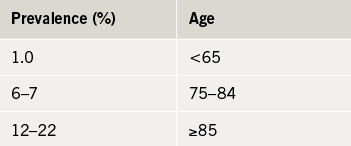Epidemiology
Burden of disease
Cardiovascular disease was second only to cancer as the leading cause of death in England and Wales in 2015 (figure 3)20. In recent years, there has been an overall decline in mortality rates from coronary heart disease but an increase in the number of patients with heart failure.21 In the UK, there are around 900,000 people with heart failure,2 and almost as many who have ‘damaged hearts’ but no symptoms of heart failure.22

According to a recent World Health Organisation (WHO) report on the global burden of disease, there were an estimated 5.7 million new cases of heart failure worldwide and 1.3 million in Europe as of 2004 (figure 4).21

In 2011, there were over 25,000 new cases of heart failure in the UK, and this number has been constant over the last few years. The British Heart Foundation (BHF) estimates that, in the UK, the incidence of heart failure in 2011 was highest in Northern Ireland and lowest in England for both men and women. However, across the UK, men had a 60% higher incidence of heart failure than women.23
The prevalence of heart failure in the UK is 1 to 2% of the population. The average age at first diagnosis is 76 years,22 and both the incidence and prevalence rise with age; around 1% of men and women aged under 65, 6-7% of those aged 75 to 84 years, and between 12 and 22% of those aged 85 and over are affected (table 2).

In England and Wales, general practitioners (GPs) keep a heart failure registry as part of the Quality and Outcomes Framework (QOF). These registers report a prevalence of heart failure of only 0.75%,24 suggesting that not all patients with heart failure in primary care are being recorded, or perhaps that the epidemiology is incorrect.

All rights reserved. No part of this programme may be reproduced, stored in a retrieval system, or transmitted in any form or by any means, electronic, mechanical, photocopying, recording or otherwise, without the prior permission of the publishers, Medinews (Cardiology) Limited.
It shall not, by way of trade or otherwise, be lent, re-sold, hired or otherwise circulated without the publisher’s prior consent.
Medical knowledge is constantly changing. As new information becomes available, changes in treatment, procedures, equipment and the use of drugs becomes necessary. The editors/authors/contributors and the publishers have taken care to ensure that the information given in this text is accurate and up to date. Readers are strongly advised to confirm that the information, especially with regard to drug usage, complies with the latest legislation and standards of practice.
Healthcare professionals should consult up-to-date Prescribing Information and the full Summary of Product Characteristics available from the manufacturers before prescribing any product. Medinews (Cardiology) Limited cannot accept responsibility for any errors in prescribing which may occur.